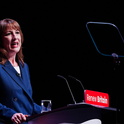It is 14 months since Boris Johnson became prime minister and promised that the UK would “lead the world” in cutting its emissions to net zero by 2050—a target adopted just a month before by his departing predecessor, Theresa May. In just over 14 months’ time, world leaders will begin to arrive in Glasgow for the rescheduled COP26 conference—the biggest set piece in climate diplomacy in over half a decade.
When Johnson picked up the UK’s bid to take on the tricky and all-important role of host, alongside negotiating a free trade deal with the EU and implementing an ambitious domestic agenda, he could not have foreseen that his government—and others around the world—would spend 2020 fighting coronavirus.
But the conference remains as urgent as ever. Despite a temporary dip in emissions, the planet keeps on warming. All countries still need to work out how to shift—with public support—from being economies powered by fossil fuels to economies that are near emissions free.
The UK has a unique opportunity to take a lead in helping the world get to net zero and to show, post-Brexit, that “Global Britain” can still be a diplomatic heavyweight. But the coming months will be vital. Our domestic record will be subject to close scrutiny. Our ability to chivvy others towards actions will depend on our own.
So, what grade does the government get for its efforts so far?
While its manifesto devoted just two breezy pages to climate change, the government has been busy in some areas. The transport department, long considered a laggard, has been busiest. Last October, it brought forward the phaseout date of petrol and diesel cars from 2040 to 2035; in March, it quietly published a strategy which spoke of the need to reduce transport demand.
Chancellor Rishi Sunak’s economic statement in July also had some green window dressing—a £2bn green home grant, a scheme to insulate public sector buildings—while parking other investment decisions until the Autumn.
But despite these encouraging initiatives, there is nothing that resembles a coherent plan for delivering net zero, sector-by-sector, and getting the UK back on track. The latest assessment by the independent Committee on Climate Change judged that the UK remained off target for its earlier. less ambitious goal—an 80 per cent reduction from 1990 levels.
The problem is not only some gaping policy gaps—the absence of any plan for the mass replacement of gas boilers and retrofitting of homes chief among them. It is also the lack of leadership and coordination in government, which raises doubts about the commitment to seeing through such a big and difficult set of economy-wide changes.
Climate change policy is currently led by the business department—not one of Whitehall’s bigger hitters. Its lack of clout means it struggles to tell other departments what to do or to hold them to account when they lag behind. The business secretary Alok Sharma, who is also responsible for COP26, spends perhaps a tenth of his time on climate change, one insider estimated during IfG research.
Last October, the prime minister announced that he would “personally chair” a new cabinet committee on climate change to drive progress. It did not meet for almost six months. And he is yet to make a big speech on net zero.
As we argue in a new report published last week, without much stronger leadership and coordination, the UK’s target will not look credible. The prime minister needs to set the tone for his cabinet—through his actions as well as his words. But given that emissions reduction is a task which will involve every government department, every regulator and every local authority, it should be run by a powerful Cabinet Office minister with the ability to “knock heads together.”
That minister should be supported by a new “net zero unit,” which coordinates a plan and holds departments to account for delivery. A siloed approach will not work: the plan needs to identify and manage dependencies between sectors, such as the huge changes the coming switch to electric vehicles will require of the energy grid.
It is far easier to set ambitious targets than to meet them. But warm words will not be enough when the UK welcomes the world to Glasgow for negotiations over what is—still—the most pressing threat of our times. With growing US-China tensions and increasing bitterness in negotiations over a UK-EU trade deal, the diplomatic task already looks daunting. To have any chance of his bet paying off, the prime minister needs to be able to show that the host is serious.
Tom Sasse is a senior researcher at the Institute for Government and a co-author of Net zero: how government can meet its climate change target
Rescheduled COP26 is 14 months away—time for the UK to show it’s serious
Climate change is still the greatest threat we face. Ahead of the summit Britain must demonstrate real leadership
September 17, 2020

Photo: SOPA Images/SIPA USA/PA Images











